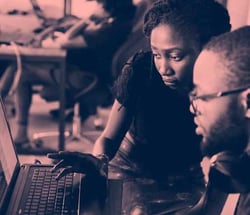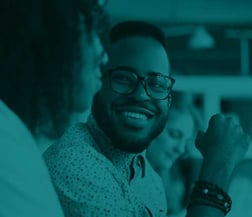Jesse Eisenburg, wearing the hoody of Mark Zuckerburg, once said:
“You have part of my attention. You have the minimum amount.”
How true this is when we are completing a task that we’re not really invested in, one that doesn’t seem relevant to us.
In learning content development I have often been posed this problem. That is: how can we be sure that people are really paying attention, and reading every word of this? How can we make them?
A traditional route, and one that can tend to make me shudder, is to lock content down. I fear the only guaranteed result of this is an uptick in Repetitive Strain Injury from those desperately trying to move on to get to that final assessment, clicking anything that moves to free themselves. Of course some narratives need that restriction in order to make sense in the correct order; and the achievement of ‘unlocking’ new chapters over time can be tantalising enough when it is done right - but usually the motivation is to give every word of copy its promised time on screen.
There’s a danger in equating attention with understanding. While it’s possible to force people to scroll through multiple pages, maybe even to read them, we can’t really prove they are absorbing that knowledge enough for it to affect their behaviour. Although, our Verify solution certainly improves that particular system.
So we come to podcasts – arguably the ultimate in mouse-free-freedom for learners.
The popularity of podcasts is undeniable, and yet they appear to have made a fairly small impact in digital learning so far. It’s true that you cannot guarantee, neither should you expect, that an individual closes their eyes and focuses on nothing else while they listen to every word. But I would suggest that it shouldn’t matter. If the argument for forced, stilted progress through learning is that people will race to the finish line otherwise without taking anything in; perhaps we need to ask ourselves whether we made the right learning in the first place.
Though relatively cheap and quick to produce – a lot of thought does need to go into podcast creation to truly make an effective experience. A style needs to be considered, a rhythm and hosting options. However, once that experience is created, it can truly speak to people on their level in a way no other medium can. If someone finds themselves laughing along with a colleague’s experience, taking a walk while learning, or even hearing the voices of people they’ve been separated from through geographical distance or functional spaces – I would call this a success.
It’s also a platform for employees to speak to each other freely and authentically, and even 5 minutes of speaking at normal pace gives us the ‘real estate’ to cover far more distance that our eyes could stand to take in on a webpage.
So – if you wish to tempt some focus, talk to us today about learning podcast creation and what it can do for your content.
Interested in a learning strategy that works? Talk to us today.







Was this article helpful?